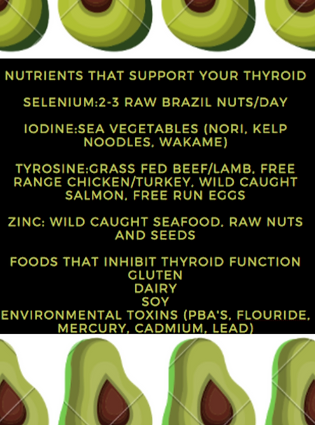If you take your index and middle finger to your Adams Apple (men) or your voice box, just underneath you will find your thyroid gland. It is amazing how this little butterfly-shaped gland weighing 1 ounce can be responsible for so many functions throughout your body. When it comes to energy levels, metabolism, temperature control and sleep, your thyroid needs to be functioning optimally. If your energy is low–workouts become compromised, if metabolism slows–fat loss is difficult and if sleep is impaired-muscle growth does not occur.

The Thyroid and Its Functions
Keeping things very simplified:
The thyroid is stimulated by the pituitary gland, which releases Thyroid Stimulating Hormone (TSH); TSH has an inverse relationship to the thyroid gland, high TSH is a sign that thyroid function is low and vice versa. The thyroid gland itself releases two hormones called thyroxine (T4) and triiodothyronine (T3). T3 and T4 are made of iodine and travel around the body with the help of proteins that carry them through the bloodstream. It is important to note that the thyroid releases mainly T4, inactive thyroid hormone, and the body (liver and other tissues) are responsible for converting T4 to active T3.
Factors That Effect Thyroid Function
Stress
Whether good (exercise) or bad (low carb, fasted cardio, 3 weeks out from a fitness competition) the body responds to stress in the exact same way. Your stress mechanism is called the ‘fight or flight’ response and once engaged a cascade of hormones are released including the stress hormone, cortisol. Cortisol is necessary in the body but too much or chronically high levels of it lower TSH, T3 and T4. The same stress response occurs with caloric restriction during contest prep or cutting phases; cortisol goes up and tells your liver to make more glucose for energy to either attack (fight) or run away (flight). The connection between the thyroid and your stress response is called the HPA Axis, for more information check out the Post Show Recovery Program at www.makeshiftshappeninc.com (hyperlink).
Toxins
The liver and other tissues are responsible for converting T4 to T3; this means that a toxic body could result low T3 even if the thyroid gland is releasing enough of its hormones. PCB’s from plastic containers and water bottles negatively affect the thyroid and are easy to swap. Eat from glass containers and switch your plastic water bottle to a stainless steel one.
Supplement powders, sugar free condiments and water flavours, are a dieting fitness athlete’s saving grace when prepping for competition or cutting. Research on the toxic effects of artificial sweeteners are linked to obesity, brain damage and poor gut function. In 2013 a doctor with the American Association of Clinical Endocrinologists saw in improved outcome with autoimmune thyroiditis patients when sugar substitutes were removed from their diets. Sachmechi I, Hussain S. Autoimmune thyroiditis with hypothyroidism induced by sugar substitutes. [Abstract #1083] American Association of Clinical Endocrinologists, 22nd Annual Scientific & Clinical Congress, Phoenix, AZ. May 1-5, 2013. Safe, natural sugar substitutes that are still ‘prep friendly’ include monk fruit extract, erythritol and stevia.
FUN FACT: doctors once used Flouride as a way to treat hyperthyroidism! Yes, that’s right, it has been proven to slow down thyroid function. Bottled water typically contains unknown amounts of fluoride; chose a water filtration system that provides purified water.
Gluten
When you eat gluten it tears holes in your gut and allows larger molecules like proteins to cross through to your bloodstream. The protein in gluten (gliaden) looks very similar to thyroid proteins; when these proteins cross through the tears your gut lining, antibodies attack them assuming they are “bad guys”. 90% of people with thyroid dysfunction have this autoimmune component. Swap out gluten in sprouted grain based breads for gluten free oats, cream of rice and starchy vegetable like yams, squash or plantain.
TAKE THE QUIZ
The thyroid is a master controller of the body and symptoms of thyroid dysfunction span across many body systems. Go through the list below— 2 or more symptoms might mean that it is time to start supporting your thyroid:
- Low energy, fatigue
- Thin brittle nails
- Dry, brittle hair or hair loss (loss of eyebrows is common for women)
- Dry skin
- Difficulty sleeping
- Cold intolerance
- Changes in menstrual cycle
- Difficult weight loss, unexplained weight gain
- Constipation
- Muscle stiffness or pain
NOTE: ” My doctor said that my blood tests for thyroid function are normal…”
1. Doctors use TSH as their main tool for assessing thyroid function:
As we learned, thyroid functions intricately with other glands and is affected by many factors. Looking at:
T3
T4
Free T3, T4
Thyroid antibodies (thyroid peroxidase or TPO and anti-thyroglobulin or TGA)
Reverse T3, T4
are ALL necessary for a full picture.
2. The lab value for ‘normal’ TSH ranges from 0.5-5.0:
Optimal TSH is actually between 1.0-2.0 but doctors will not look at the thyroid, despite symptoms unless you are outside of this huge and outdated range.
How To Support Your Thyroid With Food
Iodine
Iodine supplementation is commonly used to support the thyroid but there is much debate recently about whether this is helpful (too much Iodine can actually cause the reverse effect!) Using foods like sea vegetables naturally contain iodine and are safe and tasty! My favourite sea vegetables are nori and kelp noodles because they fit into a prep and offseason diet.
Nori: The black, thin “paper-like’ seaweeds that wraps your sushi rolls
Make a wrap with grilled chicken, avocado and lettuce using nori
Kelp Noodles: Thin, clear noodles that can be found dry or suspended in water.
These beauties are a great pasta alternative. Kelp noodles look like rice noodles with less than 1g of carb per serving. They do not require cooking and can be added to a soup or sauce.
Selenium
Selenium is necessary for the conversion of T4 to active T3. Peanut butter might be a bodybuilder’s favourite fat choice but a simple shift to 2-3 brazil nuts will give you your daily dose of selenium.
Below is an infographic for more support:

Bonus: Boost your thyroid with alternating hot and cold hydrotherapy at home! Try 3 cycles of 3 minute hot water with 10 second cold (as cold as you can take) bursts that will rev up your thyroid, help to detox the body and burn fat.
When it comes to effective thyroid support there are many factors to consider. Start with these foundations and work with a health care practitioner for support.
